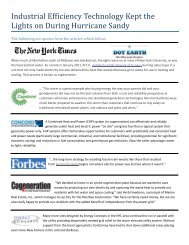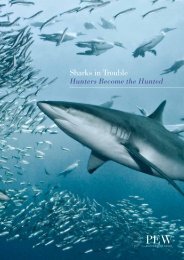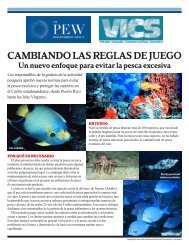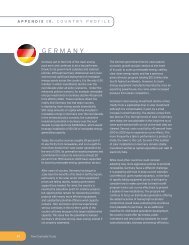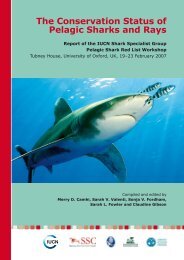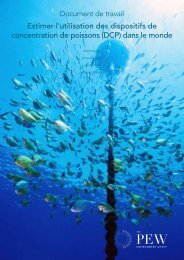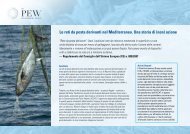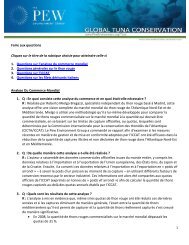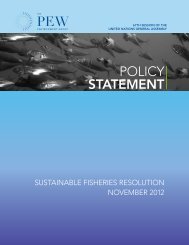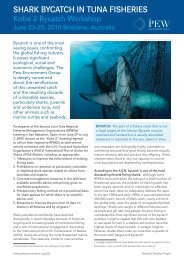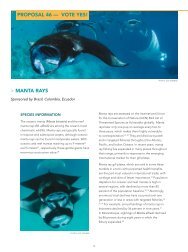POLICY STATEMENT - The Pew Charitable Trusts
POLICY STATEMENT - The Pew Charitable Trusts
POLICY STATEMENT - The Pew Charitable Trusts
You also want an ePaper? Increase the reach of your titles
YUMPU automatically turns print PDFs into web optimized ePapers that Google loves.
July 12-14, 2011<br />
La Jolla, California<br />
<strong>POLICY</strong><br />
<strong>STATEMENT</strong><br />
Recommendations<br />
to Kobe III Joint Tuna<br />
RFMO Meeting
<strong>POLICY</strong><br />
<strong>STATEMENT</strong><br />
Collectively, the convention areas of the tuna RFMOs (Regional Fisheries<br />
Management Organizations) cover over 325 million km 2 , or 91 percent<br />
of the world’s ocean surface. Within these areas, over 4 million metric<br />
tonnes of tuna are caught annually by tens of thousands of vessels, many of<br />
which move from ocean to ocean over the course of a year. <strong>The</strong> need for<br />
coordinated management of these fisheries is clear. This document outlines<br />
recommendations from the <strong>Pew</strong> Environment Group for action needed by all<br />
countries involved in fishing in the five tuna RFMOs.<br />
Recommendations<br />
At the Kobe III Joint Tuna RFMO Meeting, the <strong>Pew</strong> Environment Group calls on tuna<br />
RFMO member countries to take coordinated action on the following:<br />
1.Best Practices for Tuna Management<br />
• Improve accountability<br />
• Address overcapacity<br />
• Apply the precautionary principle and establish Total Allowable Catch limits (TACs)<br />
• Improve Fish Aggregating Devices (FADs) management<br />
2.Coordinated Action to Combat Illegal, Unreported and Unregulated<br />
(IUU) Fishing<br />
• Adopt Port State Measures (PSMs) in line with Port State Measures Agreement<br />
(PSMA)<br />
• Assist developing countries in implementing the PSMA<br />
• Adopt Unique Vessel Identifiers (UVIs)<br />
• Develop a combined IUU vessel list for all the tuna RFMOs<br />
3.Conservation Measures to Protect Sharks<br />
• Accurately assess bycatch and discards<br />
• Immediately adopt precautionary management measures for shark species<br />
• Immediately implement bycatch mitigation methods<br />
• Adopt enforceable measures for finning bans<br />
• Comply with Food and Agriculture Organization’s (FAO) International Plan of Action<br />
for the Conservation and Management of Sharks (IPOA-Sharks)<br />
• Establish greater cooperation across tuna RFMOs for shark conservation<br />
I 2
<strong>POLICY</strong><br />
<strong>STATEMENT</strong><br />
Responsible management of a global resource<br />
It is easy to forget the scope of global tuna fisheries when considered on an RFMO by<br />
RFMO basis. <strong>The</strong> fact that over 90 percent of the world’s ocean is partially managed by<br />
CCSBT, IATTC, ICCAT, IOTC and WCPFC (Figure 1), an area larger than all of the other<br />
RFMOs together (Figure 2), puts the level of responsibility for conserving and sustainably<br />
using these species into perspective. Tuna RFMOs must also protect sharks and other<br />
vulnerable species. As a group, tuna RFMOs must maintain the health of the fisheries<br />
under their remit as well as the ecosystems of which they are part.<br />
ICCAT<br />
IOTC<br />
WCPFC<br />
IATTC<br />
CCSBT<br />
CCSBT<br />
Source: Boundaries digitized from RFMO convention area descriptions found on their individual websites and FAO’s Regional Fisheries Map Viewer.<br />
Figure 1: Tuna RFMO Coverage Areas<br />
At the 2002 Earth Summit, over 170 governments agreed to take action towards reaching<br />
sustainability that included: achieving sustainable fisheries by 2015, implementing the<br />
International Plan of Action (IPOA) for capacity management, implementing the IPOA to<br />
Prevent, Deter and Eliminate Illegal, Unreported, and Unregulated Fishing (IPOA-IUU)<br />
and eliminating harmful subsidies. While many of these goals have not yet been realized,<br />
tuna RFMO members can, and should take collective action towards achieving these<br />
global commitments at Kobe III.<br />
<strong>The</strong> First Joint Meeting of Tuna RFMOs in Kobe, Japan in 2007 (Kobe I), produced a<br />
“Course of Action” outlining key challenges to be addressed as a matter of priority,<br />
such as stock assessment, management of sharks and bycatch of juvenile tunas on FADs,<br />
technical recommendations related to catch documentation schemes, unique vessel<br />
identifiers, transshipment and standardized stock assessments. <strong>The</strong> Kobe II meeting<br />
I 3
<strong>POLICY</strong><br />
<strong>STATEMENT</strong><br />
in San Sebastian, Spain in 2009 discussed progress from the first Kobe meeting (very<br />
little) and established the “San Sebastian Course of Action” for the following two years,<br />
including recommendations to:<br />
• Reduce global tuna fishing capacity.<br />
• Request scientific advice to clearly articulate risk and uncertainty to decision makers.<br />
• Establish a global register of active vessels with contributions by the five tuna RFMOs.<br />
• Establish precautionary, science-based conservation and management measures for<br />
sharks consistent with the FAO IPOA-Sharks.<br />
• Provide accurate, timely and complete data, and adopt measures to address the<br />
current low rate of compliance by RFMO participants.<br />
• Collaborate to advance implementation of a combined vessel register that<br />
incorporates a UVI.<br />
Both of the Kobe meetings and follow up workshops on bycatch and on RFMO<br />
management of tuna fisheries, in Brisbane in 2010, have failed to produce any concrete<br />
action and there has been little to no real action to reduce global tuna fishing capacity.<br />
This trend must change.<br />
Successfully carrying out the conservation and sustainable use responsibilities of tuna<br />
RFMOs is critical because across every ocean, the status of most tuna stocks is declining<br />
while IUU fishing and high levels of bycatch remain key problems for most RFMOs.<br />
Of the known highly migratory tuna and tuna-like species globally, 50 percent are fully<br />
exploited, 21 percent overexploited and 8 percent depleted 1 . Additionally, more than<br />
half of the shark species caught in high seas fisheries are classified as Endangered,<br />
Vulnerable or Near Threatened by the International Union for Conservation of Nature<br />
(IUCN). At Kobe III, tuna RFMOs have yet another opportunity to establish themselves as<br />
global leaders in sustainability by making decisions to end overfishing, rebuild depleted<br />
stocks, combat IUU fishing and significantly reduce the bycatch of sharks and other<br />
vulnerable species. This can only be achieved through coordinated action.<br />
I 4
<strong>POLICY</strong><br />
<strong>STATEMENT</strong><br />
SEAFO<br />
PSC<br />
NPAFC<br />
NEAFC<br />
NASCO<br />
NAFO<br />
IPHC<br />
GFCM<br />
CCBSP<br />
CCAMLR<br />
SPRFMO<br />
SIOFA<br />
WCPFC<br />
CCSBT<br />
IOTC<br />
IATTC<br />
ICCAT<br />
CCAMLR<br />
Commission for the<br />
Conservation of Antarctic<br />
Marine Living Resources<br />
CCSBT<br />
Commission for the<br />
Conservation of Southern<br />
Bluefin Tuna<br />
CCBSP<br />
Convention on the<br />
Conservation and<br />
Management of the Pollock<br />
Resources in the Central<br />
Bering Sea<br />
GFCM<br />
General Fisheries Commission<br />
for the Mediterranean<br />
IATTC<br />
Inter-American Tropical Tuna<br />
Commission<br />
ICCAT<br />
International Commission for<br />
the Conservation of Atlantic<br />
Tunas<br />
IOTC<br />
Indian Ocean Tuna<br />
Commission<br />
IPHC<br />
International Pacific Halibut<br />
Commission<br />
IWC<br />
International Whaling<br />
Commission<br />
NAFO<br />
North Atlantic Fisheries<br />
Organization<br />
NASCO<br />
North Atlantic Salmon<br />
Conservation Organization<br />
NEAFC<br />
North East Atlantic Fisheries<br />
Commission<br />
NPAFC<br />
North Pacific Anadromous Fish<br />
Commission<br />
PSC<br />
Pacific Salmon Commission<br />
SEAFO<br />
South-East Atlantic Fisheries<br />
Organization<br />
SIOFA<br />
South Indian Ocean Fisheries<br />
Agreement<br />
SPRFMO<br />
South Pacific Regional<br />
Fisheries Management<br />
Organization<br />
WCPFC<br />
Western and Central Pacific<br />
Fisheries Commission<br />
FIGURE 2: A comparison of the Area of Individual RFMO<br />
Convention Areas (Not accounting for overlap areas and the IWC)<br />
1.Best Practices for Tuna Management<br />
Several stocks of albacore, bigeye, bluefin, and yellowfin tuna are either overfished,<br />
or are currently experiencing overfishing. Meanwhile, the exploitation rate of some<br />
skipjack stocks is at, or near, sustainable biological targets. This situation threatens<br />
the vitality of tuna fisheries as well as the health of pelagic ecosystems. Regardless,<br />
tuna RFMOs regularly ignore these alarming statistics and opt to stick with ineffective<br />
conservation measures that are neither precautionary or ecosystem-based.<br />
<strong>Pew</strong> calls on tuna RFMO member countries and fishing entities to end overfishing of<br />
bigeye, yellowfin, albacore, and bluefin tuna stocks in 2012 by implementing scientifically<br />
based, precautionary catch limits for all species. Further, <strong>Pew</strong> calls on member countries<br />
to ensure that no overfishing occurs on skipjack stocks.<br />
Improve Accountability<br />
<strong>The</strong> conservation and management of stocks are routinely undermined by noncompliant<br />
RFMO members. Weak enforcement and compliance simply encourages<br />
further non-compliance, and decreases legitimate economic returns while threatening<br />
the future sustainability of the fisheries.<br />
Tuna RFMOs must establish a system whereby they function in a fully transparent and<br />
accountable manner that promotes high standards of sustainability, rather than weak<br />
I 5
<strong>POLICY</strong><br />
<strong>STATEMENT</strong><br />
measures, which are routinely violated with little, or no, penalty. In addition, the tuna<br />
RFMOs should fully implement compliance regimes that impose appropriate penalties<br />
on parties that violate conservation and management measures. Further, observer<br />
coverage should be pursued for 100 percent of the fleet.<br />
Address Overcapacity<br />
No tuna RFMO has successfully controlled fishing capacity. This is especially true<br />
in the purse seine fisheries for tropical tunas where uncontrolled effort coupled with<br />
the unrestricted proliferation of FADs threatens populations of bigeye, yellowfin, and<br />
skipjack tuna. Considering the catch potential of the global purse seine fleet, RFMOs<br />
must develop effective strategies to address the overcapacity challenge before this<br />
already complex problem escalates even further. Instead of waiting for increased<br />
competition for tuna resources, the tuna RFMOs should develop a transparent and<br />
effective plan to assess and address overcapacity in the near term.<br />
Apply the Precautionary Principle and Establish Science-based TAC<br />
Limits<br />
A responsible fishery management regime requires controlling fishing mortality rates<br />
at levels consistent with scientific advice for ending or preventing overfishing and<br />
rebuilding depleted stocks. According to the precautionary principle, more cautious<br />
limits should be established in the face of uncertainty. Management objectives that<br />
respect biological constraints are fundamental to the precautionary principle, which the<br />
U.N. World Summit on Sustainable Development, the U.N. Fish Stocks Agreement, and<br />
some RFMO conventions require members and parties to apply. As a starting point, all<br />
RFMOs should agree to call on their respective scientific advisory bodies to recommend<br />
appropriate target and limit reference points for albacore, skipjack, yellowfin, bigeye,<br />
and bluefin tunas in 2012 that end or prevent overfishing and rebuild depleted stocks.<br />
Improve FADs Management<br />
Given the immense catch volume generated by purse seine vessels using FADs, severe<br />
overcapacity, and the uncontrolled proliferation of FADs, <strong>Pew</strong> recommends a number of<br />
actions that the tuna RFMOs should take immediately before irreversible harm is done<br />
to ocean ecosystems. Specifically, to lessen and better understand the harmful impacts<br />
of FADs, <strong>Pew</strong> recommends that tuna RFMOs call on the RFMO scientific advisory bodies<br />
to:<br />
I 6
<strong>POLICY</strong><br />
<strong>STATEMENT</strong><br />
• recommend scientifically-based catch limits for bigeye, yellowfin, and skipjack tuna,<br />
that incorporate the catch of non-target juvenile tunas in FAD fisheries,<br />
• develop limits on the number of FADs, consistent with those scientifically based catch<br />
limits, allowed in the eastern tropical Pacific which ensures that the number of FADs<br />
does not alter the ecosystem function,<br />
• inventory and track all FADs to ensure understanding of the scope of use, and<br />
• require drifting FADs to be removed from water during fishing closures to stop<br />
ongoing increases in biomass over time,<br />
• manage and control the use of FADs to minimize bycatch of non-tuna and other nontarget<br />
species.<br />
If all of these measures cannot be achieved, then fishing on FADs should be suspended<br />
by the end of 2012.<br />
2.Coordinated Action to Combat IUU Fishing<br />
IUU fishing is a multi-billion-dollar global business that undermines sustainable fisheries<br />
management and threatens legitimate fishing operations. 2 Tuna RFMOs have a primary<br />
role to play in the global fight against IUU fishing.<br />
<strong>Pew</strong> calls on tuna RFMOs to take coordinated action towards eliminating IUU fishing<br />
operations. Such action should include developing clear and simple ways to identify IUU<br />
vessels and share relevant information beyond national borders.<br />
Adopt Port State Measures (PSMs) in Line with the Port State Measures<br />
Agreement (PSMA)<br />
<strong>The</strong> joint tuna RFMOs Workshop on Improvement, Harmonization and Compatibility of<br />
MCS measures of 2010 encouraged RFMOs, “to adopt PSMs that are consistent with the<br />
PSMA, taking into account the specific characteristics and circumstances of each RFMO<br />
on PSMs”. 3<br />
A study conducted by the <strong>Pew</strong> Environment Group highlights that with the exception of<br />
the Indian Ocean Tuna Commission (IOTC), which has recently adopted a resolution in<br />
line with the PSMA, most tuna RFMOs have significant room for improvement of their<br />
PSMs. 4 Each tuna RFMO should initiate constructive action towards the development<br />
I 7
<strong>POLICY</strong><br />
<strong>STATEMENT</strong><br />
of stronger PSMs or at a minimum, the establishment of an Action Plan on PSMs.<br />
An Action Plan on PSMs should be based on the PSMA standard, and prioritize the<br />
adoption of those measures most urgently needed in view of the challenges and<br />
particularities of each RFMO, with the final objective of reaching the PSMA standard<br />
within the next three years. <strong>The</strong> tuna RFMOs can make an important contribution to this<br />
end by ensuring a high level of harmonization of port State controls among tuna RFMOs.<br />
Assist Developing Countries in Implementing the PSMA<br />
As part of their Action Plan on PSMs, tuna RFMO Contracting Parties should analyze<br />
their implementation needs and consider feasible options that would enable them<br />
to adopt effective PSMs. In this regard, developed countries should consider options<br />
for assisting developing countries. IOTC has begun some necessary capacity-building<br />
efforts towards the implementation of its new PSMs 5 . South Korea’s initiative to hold<br />
a pre-Kobe III workshop on Capacity Building of Developing States for Port State<br />
Measures and Catch Documentation Schemes is also a positive step towards adopting<br />
and implementing PSMs.<br />
Urge Tuna RFMOs to use Unique Vessel Identifiers and Develop a<br />
Combined IUU Vessel List for all the Tuna RFMOs<br />
<strong>The</strong> Kobe II process recommended immediate action on the implementation of UVIs for<br />
tuna vessels, and the preparation of a combined tuna RFMOs IUU Vessel list 6 . Both steps<br />
are key to increasing transparency in the fisheries sector, and to enhancing coordinated<br />
action against IUU fishing operators. Research conducted by the <strong>Pew</strong> Environment<br />
Group confirmed the need for such instruments. 7<br />
<strong>The</strong> only fully developed and currently used UVI is the International Maritime<br />
Organization (IMO) number, provided through registry with the IHS-Fairplay ship<br />
numbering scheme (IHS-F, previously Lloyd’s Register). RFMOs should require that any<br />
fishing vessels with a permit to fish in their convention area, and support vessels, register<br />
with IHS-F and obtain an IMO number. Flag States that are RFMO parties should also<br />
require all of their flagged vessels to register with IHS-F and have an IMO number and all<br />
member states to require that their flagged vessels carry UVIs. This number should be on<br />
record, used in all relevant communications and be made publicly available.<br />
I 8
<strong>POLICY</strong><br />
<strong>STATEMENT</strong><br />
A number of RFMOs incorporate IUU vessel lists adopted by RFMOs in their own<br />
regimes, hence expanding the global reach of those lists. Progress by the tuna RFMOs<br />
to consolidate their fishing vessel lists, of both authorized and IUU vessels, would<br />
multiply the effectiveness of information already available. In combination with the<br />
requirement of UVIs, this action would significantly improve efforts to track IUU fishing<br />
vessels and contribute to closing the net around IUU fishing operators on a global scale.<br />
3.Conservation Measures to Protect Sharks<br />
More than half of the shark species caught in high-seas fisheries are classified as<br />
Endangered, Vulnerable or Near Threatened by the IUCN. Sharks are essential to the<br />
health of ocean ecosystems and the economies of many countries.<br />
Kobe III provides another opportunity to raise the profile on the need for effective<br />
management of sharks by tuna RFMOs, particularly the need for consistent measures<br />
across all the RFMOs. <strong>The</strong> <strong>Pew</strong> Environment Group calls on member countries to agree<br />
to concrete actions to address shark management and conservation.<br />
Previous Kobe Meeting Commitments on Sharks<br />
Participants of the Second Joint Tuna Regional Fisheries Management Organizations<br />
(RFMOs) meeting in San Sebastian, Spain, from June 29 to July 3, 2009, (the “Kobe II”<br />
meeting) agreed to call on their respective RFMOs to take several actions consistent<br />
with the FAO’s IPOA-Sharks, including, as appropriate:<br />
“1. Measures to improve the enforcement of existing finning bans;<br />
2. Prohibitions on retention of particularly vulnerable or depleted shark species, based<br />
on advice from scientists and experts;<br />
3. Concrete management measures in line with best available scientific advice with<br />
priority given to overfished populations;<br />
4. Precautionary fishing controls on a provisional basis for shark species for which there<br />
is no scientific advice; and<br />
5. Measures to improve the provision of data on sharks in all fisheries and by all gears.”<br />
I 9
<strong>POLICY</strong><br />
<strong>STATEMENT</strong><br />
“No<br />
Data—<br />
No<br />
Fishing”<br />
Accurately assess bycatch and discards<br />
RFMOs should adopt “No Data—No Fishing” requirements, so that any member<br />
failing to provide credible required information/data should be prohibited from fishing,<br />
particularly with regard to sharks. Data should include: species-specific data on catches,<br />
effort by gear type, landings and trade, and complete bycatch and discard (both dead<br />
and alive) at the species level.<br />
Immediately adopt precautionary management measures<br />
Where science-based conservation and management plans are not in place, retention<br />
should be prohibited for shark species at risk, including target species and bycatch.<br />
Additionally, RFMOs should agree to prohibit retention of any species listed in Appendix<br />
I of the Convention on International Trade in Endangered Species of Wild Fauna and<br />
Flora (CITES) or on the IUCN Red List of Threatened Species as Critically Endangered,<br />
Endangered or Vulnerable (the “Threatened” category). All RFMOs should also adopt<br />
zero retention measures for oceanic whitetip, bigeye thresher and hammerhead shark<br />
species.<br />
Full stock assessments can take years to complete and should not preclude<br />
precautionary management in the interim, especially in light of the difficulty of obtaining<br />
sufficient data and ongoing population declines for these species. Management<br />
decisions can be taken on the basis of observed declines in catch records, conservation<br />
status as determined by IUCN or as a result of an ecological risk assessment.<br />
Immediately implement bycatch mitigation methods<br />
Require that mandatory gear modifications are made on pelagic longlines, including<br />
a ban on wire leaders. Use of this gear creates a de facto targeted fishery for sharks.<br />
Prohibition of the gear allows sharks to escape, reducing shark mortality.<br />
I 10<br />
According to the IUCN, bycatch is one of the gravest threats facing sharks. Oceanic whitetip (Carcharhinus<br />
longimanus) Credit: Manu San Felix.
<strong>POLICY</strong><br />
<strong>STATEMENT</strong><br />
Adopt easily enforceable measures for finning bans<br />
To implement the Kobe II recommendation on improving the enforcement of finning<br />
bans, all tuna RFMOs should adopt “fins naturally attached” policies. Adoption of this<br />
method will help prevent circumvention of the law or rule and provide the optimum<br />
conditions for monitoring and enforcement.<br />
Comply with FAO’s IPOA-Sharks<br />
Consistent with FAO’s IPOA-Sharks, member States should develop a national plan of<br />
action for the conservation and management of sharks (NPOA-Sharks) if their vessels<br />
conduct directed fisheries for sharks or if their vessels routinely catch sharks in nondirected<br />
fisheries, or as bycatch.<br />
Establish greater cooperation across tuna RFMOs<br />
Members should expeditiously undertake fishing trials to determine the feasibility and<br />
effectiveness of appropriate combinations of other gear specifications, fishing practices<br />
and measures in reducing the bycatch, injury and mortality of sharks. Shark deterrents—<br />
including magnetic, electropositive rare earth metals and electrical deterrents—hold<br />
promise but require significantly more investigation and large-scale trials.<br />
To ensure greater cooperation, coordinated data sharing and collection among RFMOs,<br />
a joint task force focused on key bycatch species should be convened annually. This<br />
would assist with harmonizing the conservation and management measures and sharing<br />
research advances in a timely manner by each of the five tuna RFMOs.<br />
<strong>Pew</strong> believes shark fishing should not occur in the absence of scientific population assessments and management<br />
plans. Silky shark (Carcharhinus falciformis) Credit: Chris & Monique Fallows/OceanwideImages.com.<br />
I 11
<strong>POLICY</strong><br />
<strong>STATEMENT</strong><br />
1 Maguire, J.-J.; Sissenwine, M.; Csirke, J.; Grainger, R.;<br />
Garcia, S. <strong>The</strong> state of world highly migratory, straddling<br />
and other high seas fishery resources and associated<br />
species. FAO Fisheries Technical Paper. No. 495. Rome:<br />
FAO. 2006. 84p.<br />
2 Estimates of the total value of current IUU fishing losses<br />
worldwide are between US $10 bn and US $23.5 bn<br />
annually, representing between 11 and 26 million tonnes<br />
of fish Agnew, D. et al, Estimating the Worldwide Extent of<br />
Illegal Fishing. PLoS One, 2009, Vol. 4, issue 2.<br />
3 Report of the International Workshop on Improvement,<br />
Harmonization and Compatibility of Monitoring, Control<br />
and Surveillance Measures, Including Monitoring Catches<br />
from Catching Vessels to Markets (Barcelona, Spain, May-<br />
June 2010), Doc. No. TRFMO2-W2-012A /2010.<br />
4 See “Closing the gap: Comparing tuna RFMO port State<br />
measures to the FAO Agreement on Port State Measures”<br />
distributed at this Third Joint Meeting of the Tuna<br />
Regional Fisheries Management Organizations.<br />
5 “Strengthening implementation of the IOTC Port State<br />
Measures Resolution through assessment and training<br />
in five countries: Mauritius, Mozambique, Seychelles,<br />
Tanzania and Kenya”, Workshop, 16-20 May 2011,<br />
Seychelles.<br />
6 Recommendations of the Kobe Process; Extracts of the<br />
Reports of the Kobe II Meeting and Workshops, Document<br />
K3-001.<br />
7 Flothmann S., Kistowski K.v., Dolan E., Lee E., Meere F.,<br />
Album G. (2010) Closing Loopholes: Getting Illegal Fishing<br />
Under Control. Science 328 no. 5983, 1235-1236. http://<br />
www.sciencemag.org/content/328/5983/1235<br />
PEW ENVIRONMENT GROUP<br />
Philadelphia, Pa. 19103<br />
Tel. +1 215-575-2000<br />
Washington, D.C. 20004<br />
Tel. +1 202-552-2000<br />
1050 Brussels, Belgium<br />
Tel. +32 (0) 2 274 1620<br />
www.pewenvironment.org/ip<br />
international@pewtrusts.org<br />
Contact: international@pewtrusts.org<br />
For additional resources, visit us at www.pewenvironment.org/ip.<br />
ABOUT THE PEW ENVIRONMENT GROUP<br />
<strong>The</strong> <strong>Pew</strong> Environment Group is the conservation arm of <strong>The</strong> <strong>Pew</strong> <strong>Charitable</strong> <strong>Trusts</strong>, a non-governmental organization that works<br />
globally to establish pragmatic, science-based policies that protect our oceans, preserve our wildlands and promote clean energy.



